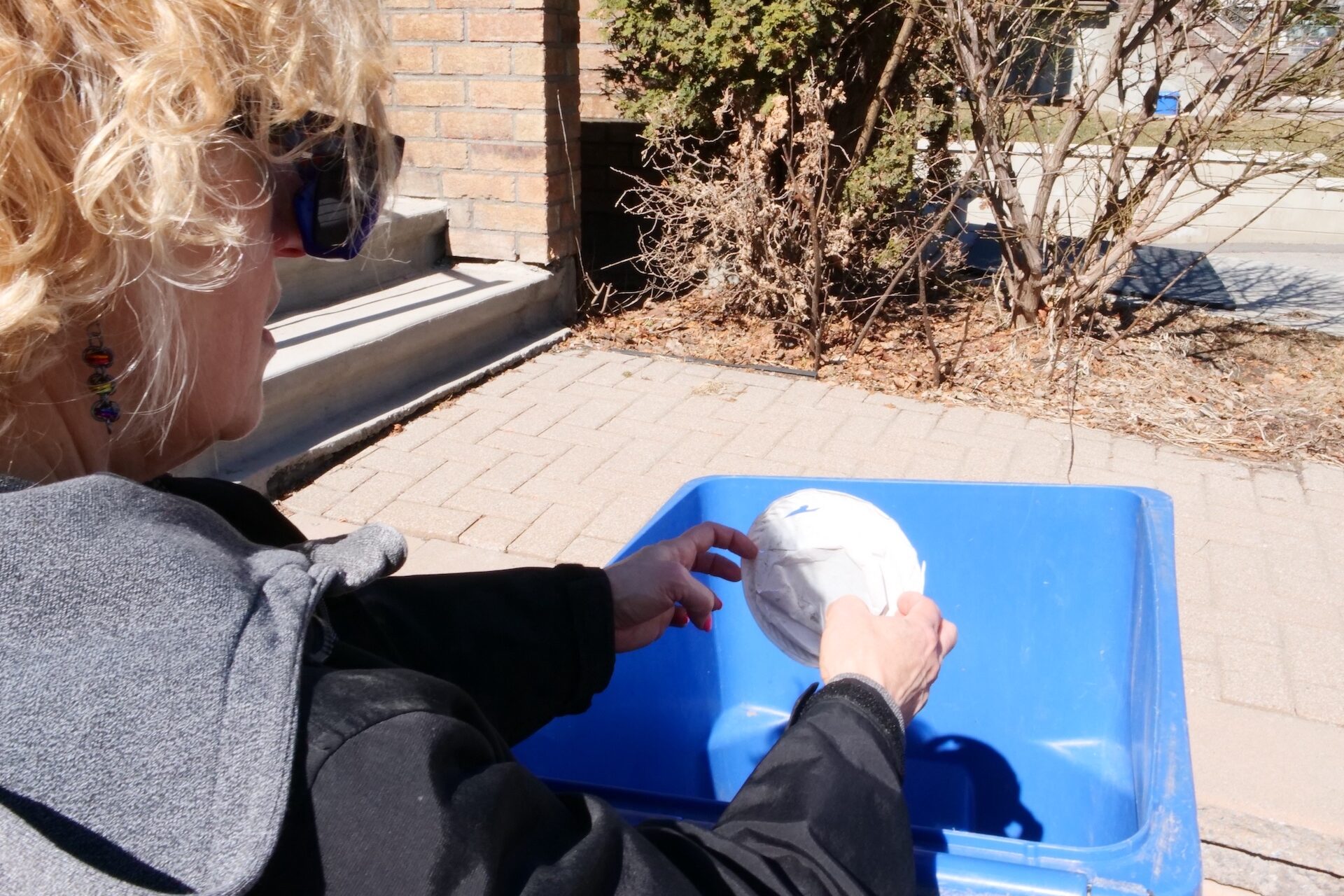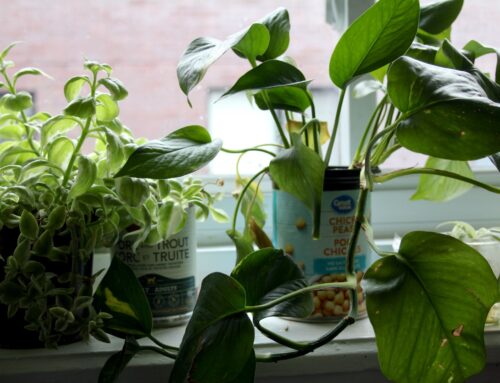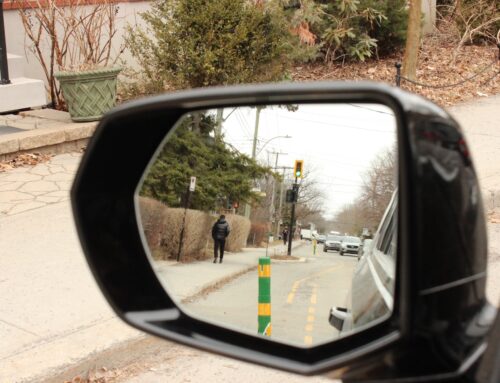BYJared Lackman-Mincoff & Leana Schulz
Melodie Le Siege makes a real effort to reduce her household waste.
She and her family consume 100 per cent plant-based products to minimize their greenhouse emissions. Le Siege even tries to create the least waste possible when shopping.
“I do try to shop at bulk stores like Épicerie Loco in Montreal, or even Bulk Barn, stores where you can buy items in bulk and refill your own containers,” she says. “So that minimizes quite a bit of plastic and aluminum waste.”
Le Siege won a Concordia Sustainability Champion award in 2024, mainly for her zero-waste workshops and her volunteer work in helping the university sort its trash. She says it is all about encouraging others to think about the materials they consume.
“It’s basically encouraging people to audit their waste. A lot of times we have a separation from our trash, we don’t think about where it ends up, or processes in place to discard it,” she says.
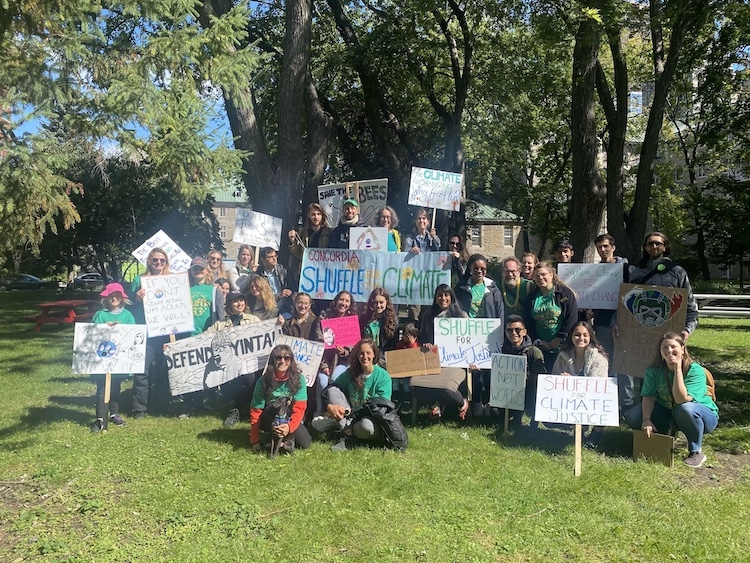
Melodie Le Siege helped organize the Concordia Shuffle walkathon in 2022. The walkathon’s purpose was to raise money for student sustainability bursaries at Concordia. Photo courtesy Melodie Le Siege.
While La Siege shows that minimizing waste can be done, few Montrealers follow her example.
Karel Ménard is the director of the Quebec collective for ecological waste management (FCQGED). He says that recycling performance goes well beyond simply dumping material into a blue bin for city workers to come and collect.
“What the Lachine sorting centre is doing with collected materials, or what the Montreal-East sorting centre is doing, I don’t know,” he says. “Right now, there’s no way to know.”
A big factor in the publication of information is the transfer of recycling responsibilities in Quebec. On January 1, 2025, responsibilities for collection, sorting, and re-use in Quebec moved from individual municipalities to the private sector. Éco Entreprises Québec (EEQ) is the organization which oversees all private companies who will now handle recycling. EEQ also ensures that businesses comply with provincial regulations.
Discover how Montreal’s recycling efforts are making an impact! This video story dives into how a local business is recycling and what measures the city takes to make it even easier. Video by Leana Schulz.
Marie-Claude Rivet is the director of internal communications and public affairs at EEQ. She says that, with the redistribution of responsibilities, it will now be up to EEQ to keep track of recycling performance rather than the private companies operating triage and sorting centres.
“The main thing that changed with modernization of curbside recycling is that the materials are owned by the producers,” she says. “The materials are owned by Éco Entreprises Québec.”
Rivet specifies that, since EEQ has only been overseeing recycling for three months, it does not have many concrete performance figures yet.
“It’s very early to draw conclusions or make statistics that could be used to make decisions,” she says.
However, Rivet says that EEQ keeps track of sorting centre performance on a weekly basis. The EEQ hopes that as it spends more time gathering information, it will become more reliable.
It is hoping to begin publishing performance information by the end of 2025, but more likely in 2026.
“Then we’ll have numbers that will be reliable and we can then make better choices for the future,” Rivet says.
Stephanie Valenzuela is a city councillor in the district of Darlington in Notre-Dame-de-Grace. She is also the spokesperson of the official opposition for sustainable development. She gives her input on all environment-related matters that the city of Montreal handles, including recycling.
“I believe in 2023-2024 there has been an improvement in the amount recycled per resident. I think it went up by a kilogram or so,” Valenzuela says.
However, she feels it is largely due to increased online shopping or people ordering food to their house. Valenzuela does not think it is a proper indicator of better performance.
“I don’t think it’s a very clear portrait as to what is still being sent out to landfills that could be recycled,” she says.
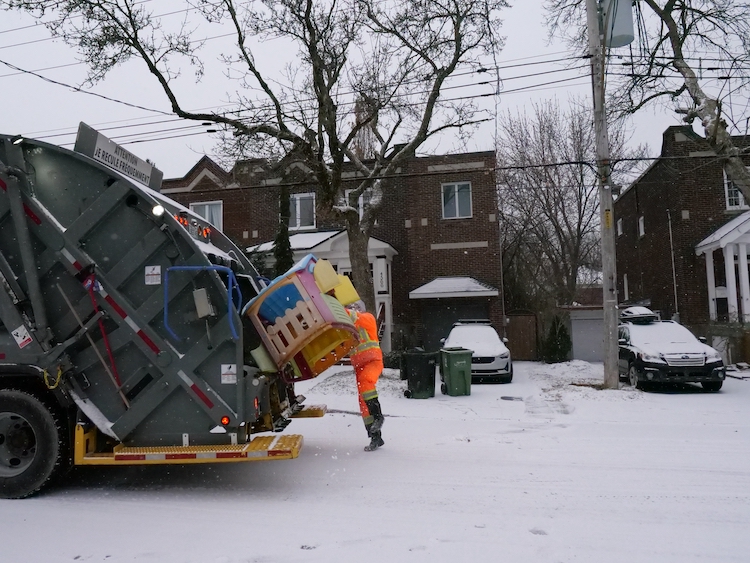
Montreal city workers collecting recycling in Notre-Dame-de-Grace on March 24, 2025. Photo by Jared Lackman-Mincoff.
Ménard feels the province can improve in two key areas: informing citizens and repurposing materials.
Statistics Canada says that the country recycled roughly 10 million tonnes of waste in 2022, about 27 per cent of the total collected material. Quebec accounted for over a quarter of the total recycled material, slightly below the national average.
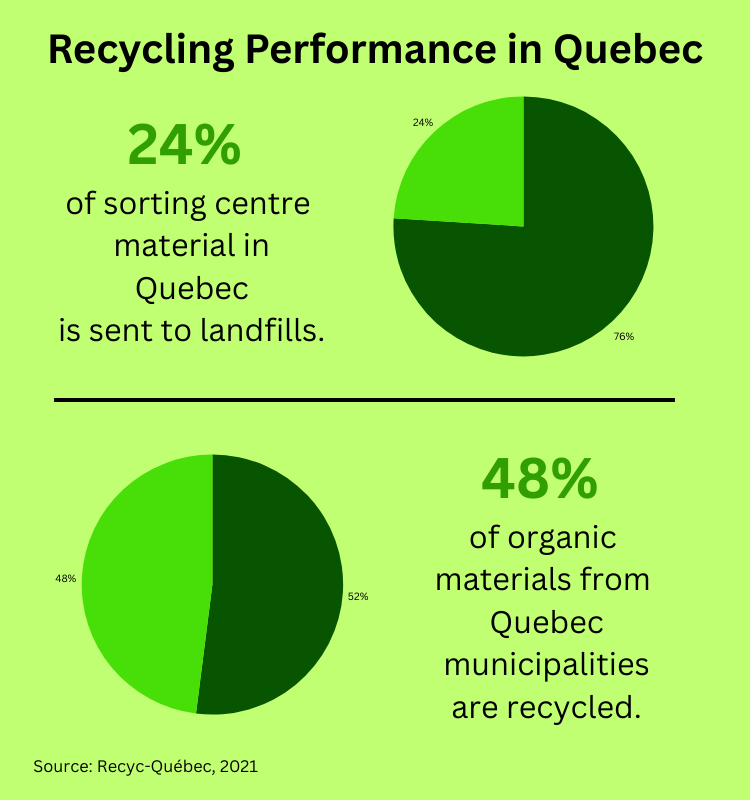
Montrealers and Quebecers can be better informed about recyclable materials. Infographic by Jared Lackman-Mincoff.
Ménard worries that the shift to the private sector could make it even more difficult to find up-to-date figures regarding recycling performance in Quebec.
“I’m not saying we won’t have the information, but we have to be vigilant because maybe the private companies will be tempted to not discuss the information if the performance is not good, or for whatever reason,” he says.
Ménard has been a part of several committees that have spoken to public officials about the importance of easy access to information regarding recycling. Part of his reasoning is that it is not only Montrealers and Quebecers who need to know which materials to recycle, but producers as well.
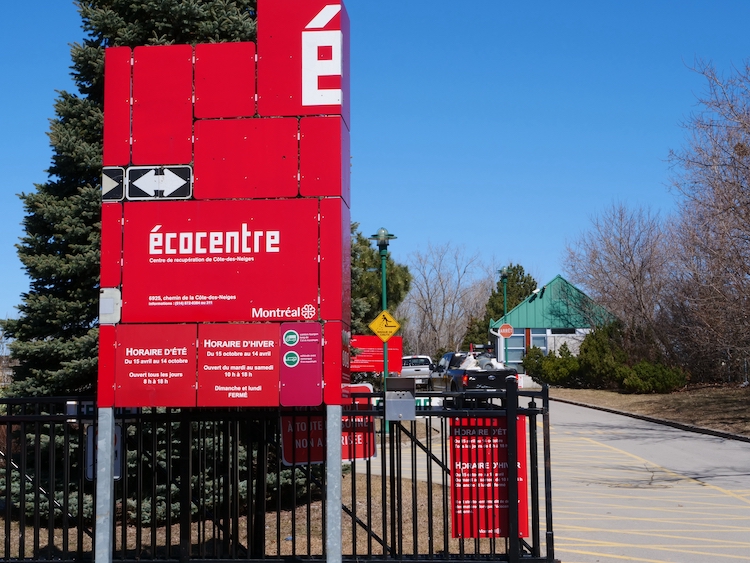
Montrealers can go to an écocentre to drop off materials that can’t go in their recycle bin. Photo by Jared Lackman-Mincoff.
“If we’re going to put a certain material on the market, we have to make sure it’s accepted by recycling factories,” he says.
Another issue is that not every factory in Quebec accepts every recyclable material. According to Recyc-Quebec, only 13 out of 23 sorting centres in Quebec accept empty paint cans, and only three of the 23 accept styrofoam.
Ménard fears this issue could get worse with the shift to the private sector. He says that since companies are in the business to make profits, they may choose not to recycle materials for which the markets are not as strong.
“Montreal, last October or November, closed the Saint-Michel sorting centre, which was one of the worst sorting centres in Quebec,” Ménard says. “It was a private company that was just there for profits to the detriment of the environment.”
Ultimately, Ménard believes that citizens have a part to play in gathering their own information, but he feels that it is up to recycling companies to make it worth their while.
“Citizens have to inform themselves on what they have to do for proper collection, but municipalities and now private companies have to say, ‘Here’s why we have to collect. Here’s why it’s beneficial,’” he says.
Le Siege makes a concerted effort to inform herself on the best recycling habits.
“I use the app ‘Ça va où?’ That kind of tells you what things go where. I check the Montreal website as well for indications about what should be recycled,” she says.
But she acknowledges that she is more informed than the average Montrealer, and she agrees with Ménard that more needs to be done to help Montrealers actively engage with recycling information.
“I feel that a lot of times you have to actually go and seek out the information,” she says. “I do find that there’s a lot missing in terms of bringing awareness to the population, because a lot of people just tune out that information.”
